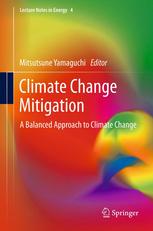

Most ebook files are in PDF format, so you can easily read them using various software such as Foxit Reader or directly on the Google Chrome browser.
Some ebook files are released by publishers in other formats such as .awz, .mobi, .epub, .fb2, etc. You may need to install specific software to read these formats on mobile/PC, such as Calibre.
Please read the tutorial at this link: https://ebookbell.com/faq
We offer FREE conversion to the popular formats you request; however, this may take some time. Therefore, right after payment, please email us, and we will try to provide the service as quickly as possible.
For some exceptional file formats or broken links (if any), please refrain from opening any disputes. Instead, email us first, and we will try to assist within a maximum of 6 hours.
EbookBell Team

0.0
0 reviewsClimate change is mainly caused by emissions of CO2 from burning fossil fuels, which provides over 85% of the world’s energy. Strategies for mitigating climate change are connected with handling economic and social activities through their effects on the use of energy. Climate Change Mitigation investigates the costs of mitigation measures in comparison to their benefits, and compares the effects of implementing mitigation measures on various areas such as energy security and energy economy.
“For 20 years, diplomats have struggled to make progress on climate change, mostly because global diplomacy is not well-linked to the realities of how nations and firms control emissions and adapt to the impacts of a changing climate. In this excellent book, Dr Yamaguchi has assembled experts to guide the redesign of global policy. The authors underscore how global warming efforts must resonate with other policy goals.” David G. Victor, Director, Laboratory on International Law and Regulation and Professor, University of California San Diego
“Climate Change Mitigation clarifies that climate change cannot be controlled by sacrificing economic growth or other global problems; however, action to control climate change cannot be delayed.Climate policy is pervasive and affects all dimensions of international policy;but it cannot be too ambitious: a balanced approach between mitigation and adaptation, economic growth and resource management, and short term development and long term investments, should be adopted. I recommend its reading.” Carlo Carraro,President, Ca’ Foscari University of Venice
“The International Energy Agency estimates for every $1 of investment now toward sustainable energy, $4 of future spending can be saved. There is a business case for companies to reduce energy use. Companies in the energy and resource intensive industries must lead the way.” Chad Holliday, Chairman. World Business Council for Sustainable Development and former Chair and CEO, DuPont